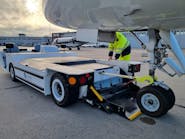When core shareholders all rush for the exits at the same time, be prepared for trouble.
BAE Systems, DaimlerChrysler, and Lagardère each announced a disposal of their stake in Europe's Airbus venture last month, muttering vaguely about other plans. Now we know what was on their minds.
The electrical systems on the A380 "fly-by-wire'' super-jumbo, the most ambitious aircraft ever built, fruit of $11 billion of sunk costs, are apparently a shambles. "Hundreds'' of other problems have yet to be resolved.
And, just as Airbus announces the major production delays for the A380, the International Civil Aviation Organisation (ICAO) has recommended a far greater separation between the A380 and the next plane than it has with any other aircraft.
The wake turbulence from the A380 may be such a threat to other aircraft on take-off and landing that ICAO is imposing a barrier of 10 nautical miles, twice the distance for a Boeing 747. Airbus wanted just six nautical miles to separate the A380 from the next aircraft when landing.
ICAO has not made its recommendations for take-off separations.
The final approach rule, temporary at first, changes the cost calculus for airports such as Heathrow, which depend on constant traffic flow for profit margin.
Airbus announced earlier this week that just nine of the $300 million double-decker whales will be delivered next year instead of 20 to 25, with a backlog of delays and penalty clauses cascading through the decade.
At a minimum, the blunder will cut profits by 2 billion euros over four years, the company admitted yesterday.
The verdict on the Paris bourse was swift and brutal. The Franco-Geman mother company, EADS, lost a third of its value before lunch, recovering slightly to close down 26 percent at 18.73 euros.
David Buik from Cantor Fitzgerald said: "This is an absolute catastrophe of the highest order. At least some French lawyers will be very busy with litigation.''
Sash Tusa, a Goldman Sachs analyst, said the debacle had stunned investors: "This is very damaging to both the credibility of EADS management, and also to Airbus's reputation for programme management.''
Emirates Airlines, the irrepressible Dubai-based carrier with the biggest launch order, for 43 aircraft, will now have to wait an extra seven months before receiving its first batch. The company said it was "considering its position'' but denied it was mulling cancelling orders.
A "not happy'' Singapore Airlines said it was already in talks with Airbus over compensation. Rubbing salt into the wound, the company announced a $4.5 billion order yesterday for 20 Dreamliners, the super-efficient Boeing 787 mid-haul jet made from carbon composites.
John Leahy, Airbus's chief operating officer, confessed that the cock-up would cost "hundreds of millions'' in late delivery penalties but hoped the storm would pass without causing deeper damage. "The airlines are upset, but they're staying with the programme,'' he said.
EADS's share price has now fallen 48 percent since April, shedding some 15 billion euros in market capitalisation. The group derived the lion's share of its 2.9 billion euros profits last year from its 80 percent stake in Airbus.
It is a sobering moment for Europe's flagship industrial venture, at the peak of its fortunes just months ago.
"The symbol of what Europe can achieve,'' in the words of French president Jacques Chirac, it now risks suffering the same fate as the draft European constitution, fellow child of a hubristic French elite.
The next shoe to drop is likely to be the mid-haul A350, much denigrated as a revamped hybrid that relies on the ageing core of a previous model. Airbus has netted 180 orders for the aircraft, against 400 for Boeing's higher-tech Dreamliner, but these are not secure.
Qatar Airways said last week that it may scrap its $10 billion order for 60 aircraft if there are further delays. It said: "We won't wait forever. If Airbus is not capable of meeting our needs, we'll look elsewhere.''
Tim Clark, the president of Emirates, said the A350 is a terrific aircraft. "Unfortunately for Airbus, two things happened: Boeing came up with an even better plane and the price of fuel went through the roof,'' he said.
Airbus is gritting its teeth and preparing to go back to the drawing board to design an entirely new aircraft, with longer range and more capacity. Estimated cost? An extra $5 billion, and two years' further delay.
Fitch Ratings downgraded EADS yesterday, citing the cracks emerging in the two principal pillars that will support Airbus over the next decade.
Banks scrambled to lower estimates, with downgrades from Deutsche Bank, SG Securities, HypoVereinsbank, and Oddo Securities, all now distrustful of the jostling Franco-German, twin-headed management.
Morgan Stanley said there was a risk that customers may start to cancel existing orders for the A380, opting to for Boeing instead.
Airbus currently has 159 firm orders, but needs roughly 300 at the current euro-dollar exchange rate to be sure of breaking even.
Matthieu Raimbault, an analyst at Vile Tradition in Paris, said Airbus is paying the price for neglecting bread-and-butter business to build a glamour jet able to carry up to 853 passengers.
"EADS made a strategic error by opting for a jumbo rather than a fuel efficient model, especially if the price of oil increases further,'' he said.
For now Airbus is still riding the wave of a lucrative aerospace boom that reached a peak last year with record orders for 1,111 aircraft, leaving it with a $200 billion backlog and plenty of work until the end of the decade.
But aerospace is fickle, ever at risk from the ups and downs of the global cycle, as Boeing discovered in its near death experience after 9/11. Total orders for big jets worldwide are expected to fall from 2,173 last year to 800 this year, and could dip much deeper if the world's central banks keep turning the monetary screw to curb inflation.
Tim Van Beveren, a German television producer and author of a book on Airbus, said the company had staked its destiny on the wrong model with the A380.
"It's going to be the biggest flop since the Concorde. Airbus always wants to be the biggest, the newest, and the best, but it has this habit of over-promising,'' he said.
"The A380 may have a future as a cargo freight plane. But what passengers want these days is to fly point to point rather than being herded through big hubs,'' he said.
He said the electrical system was coming under intense scrutiny from the certifying authorities after a Swiss Air crash in 1998, traced to faulty wiring.
The A380 has been struggling with excess weight, too heavy for the landing gear. A wing, built at Broughton, north Wales, snapped during a stress test in February at a level below the requirement of 1.5 times maximum load, in part because the wings had been shaved so thin to save weight.
Airbus has been a great success story, rising from derided upstart to global leader in civil aviation with factories across Europe. But it is a hard company to love.
The eminence grise is France's Noël Forgeard, co-chief of EADS and confidant of President Chirac, with Gaulliste arrogance and sharp elbows to match.
Mr Forgeard waged a bare-knuckle campaign last year to gain dominant control over EADS, upsetting the delicate Franco-German balance that has always been the secret of its success.
The bitter taste left in the mouth by that unseemly affair has not been forgotten by the German side.
A great number of investors are starting to feel the same way.
A380 customers' orders
Air France 10
China Southern Airlines 5
Emirates 43
Etihad Airways 4
Federal Express 10
Int'l Lease Finance Corp 10
Kingfisher Airlines 5
Korean Air Lines 5
Lufthansa 15
Malaysian 6
Qantas Airways 12
Qatar Airways 2
Singapore Airlines 10
Thai Airways 6
UPS 10
Virgin Atlantic 6
TOTAL 159
Battle for subsidies in fight for supremacy
Airbus and Boeing are bitter rivals for the crown of world number one in passenger jets, each accusing other of state support.
The Europeans have staked their future on the A380 superjumbo, a double-decker the length of eight London buses and with room for 853 people.
The Americans have opted for the mid-sized Dreamliner, betting that more people will travel in criss-cross patterns to smaller cities rather than hub to hub.
Airbus is owned jointly by interests in France, Germany, Spain and - for now - Britain. It enjoys government guarantees for loans to develop new aircraft. If the model is a flop, the taxpayer foots the bill. Aid in one form or another is estimated by critics to be $1 billion (£540 million) over the years. Boeing in turn is cross-subsidised by fat contracts from the US Defence Department and spin-offs from Nasa space research, allegedly amounting to $29 billion of aid since 1992.
It will take the best minds at the World Trade Organisation to untangle this thicket
Copyright 2005 LexisNexis, a division of Reed Elsevier Inc. All rights reserved.
Terms and Conditions | Privacy Policy
News stories provided by third parties are not edited by "Site Publication" staff. For suggestions and comments, please click the Contact link at the bottom of this page.





